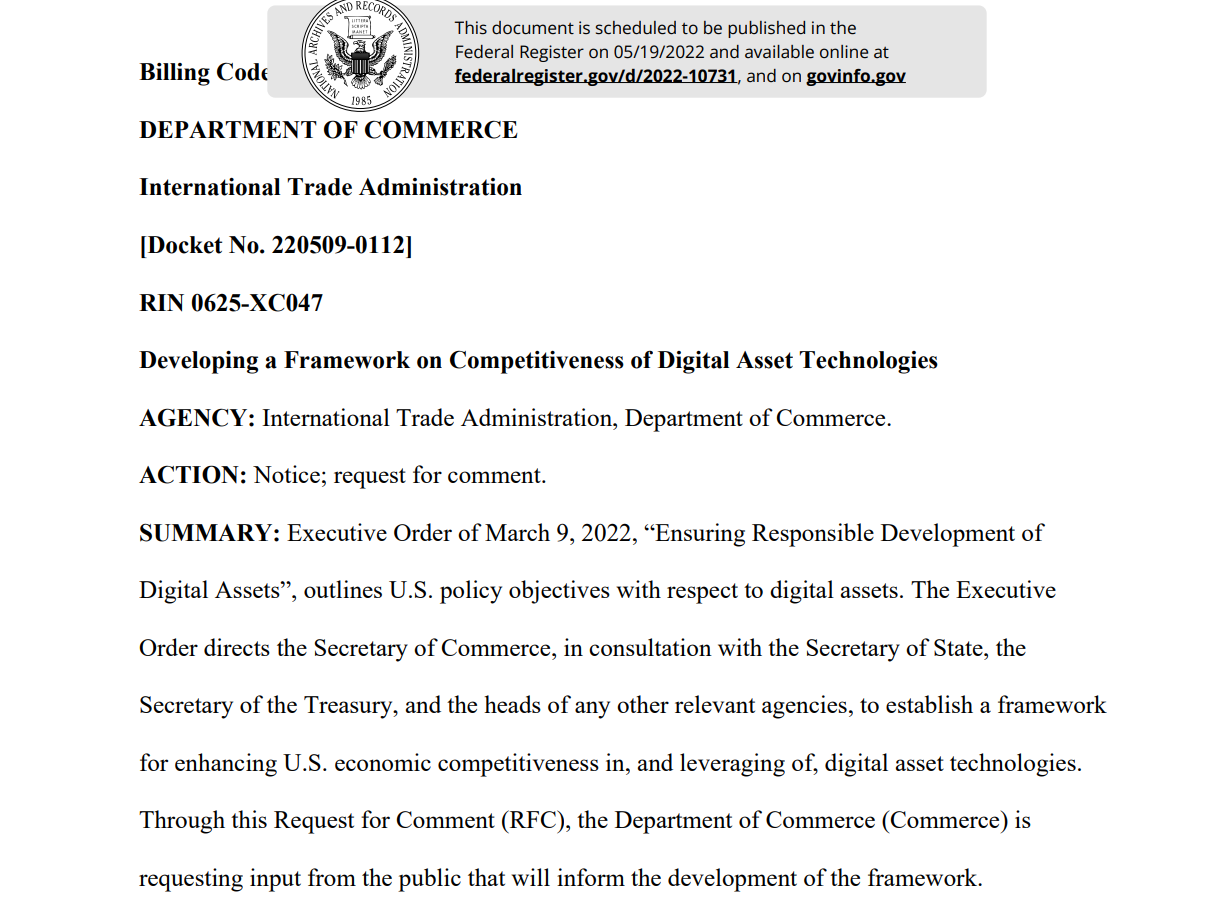The United States Department of Commerce is calling for submissions on how it can establish a framework that will bolster American economic competitiveness in digital assets including crypto and stablecoins.
The Department of Commerce (DoC) intends on publishing a series of 17 questions in a request for comment through the International Trade Administration. The request will be published in the Federal Register on Thursday.
The questions pertain to the DoC’s efforts to develop a framework for challenges to the growth of American economics regarding digital assets, as requested by President Joe Biden’s Executive Order.

The questions will cover a range of topics related to crypto businesses in the U.S. such as views on how regulations can enhance competitiveness and what obstacles business owners currently face. It will also cover digital asset mining, likely in relations to Bitcoin (BTC) and Ether (ETH). One asks:
“What, if any, is the future role of digital assets mining in the U.S. digital assets sector? In what ways can the U.S. government and U.S. companies drive competitive, sustainable (for the environment and energy consumption) development of digital assets?”
The U.S. is currently the largest Bitcoin mining country, producing 37.84% of the world’s hashing power as of January, according to the Cambridge Bitcoin Electricity Consumption Index. By that metric, it appears there are many businesses that believe in the future of digital asset mining.
Remember Biden’s crypto executive order from two months ago?
Buried in it was homework for the Department of Commerce:
Make a plan for driving U.S. competitiveness and leadership in crypto.
Well… ():https://t.co/zvAbUpG7M8 pic.twitter.com/ymzm1f9g13
— Adam Kovacevich (@adamkovac) May 10, 2022
Among those miners, demand for sustainable energy sources and carbon neutrality is on the rise. Investors like Kevin O’Leary, who are driving demand for sustainable mining, told Cointelegraph on May 10 that the crypto industry is “at an interesting inflection point” when it comes to environmental conscientiousness.
Although the Federal Reserve Board reiterated in its May 9 Financial Stability Report that it currently has no plan to develop a central bank digital currency (CBDC), one of the questions from the DoC will ask about the potential impact of a CBDC on business.
The DoC will also ask whether digital assets can help unbanked Americans gain access to the financial tools they may need but cannot get through traditional means. Banking the unbanked has long been a use case that crypto industry insiders boast as a natural fit for the technology:
“What role can the Federal government and the digital assets sector play to ensure that under-served Americans can benefit from the increased commercial availability of digital assets?”
The request for public comment will inform the DoC’s thinking in making the framework for an American digital asset business regulatory framework. This early, open approach toward the DoC’s efforts reflects Secretary of Commerce Gina Raimondo’s March 9 statement in response to President Biden’s Executive Order. She said her department would promote “the resilience of the U.S. financial system” by working with digital assets industry partners to “mitigate risks for the businesses and individuals who rely on it.”
Related: US agencies warn against the influx of North Koreans in IT and crypto jobs online
If the questions are published on Thursday as expected, comments will be accepted through July 5 and can be sent to digitalassets@trade.gov.
The US Department of Commerce (DoC) recently announced their proposed crypto framework as part of their commitment to promote innovation and foster economic growth within the cryptocurrency industry. The DoC has identified 17 key questions that are intended to aid in the development of responsible regulatory policies for virtual currencies and its underlying technology, distributed ledger technology (DLT).
The framework is designed to allow the government to better understand the cryptocurrency industry and the security, consumer protection and anti-money laundering measures needed to regulate it. Questions range from the framework’s goals and objectives, economic and financial regulations for virtual currency activities, consumer protection regulations, and measures to combat the misuse of digital currencies for fraudulent purposes.
The DoC plans to use feedback from the public and industry stakeholders in developing a framework that fits the needs of the cryptocurrency industry. These questions include topics such as potential consumer protection regulations, what role central banks and other financial institutions should play in the cryptocurrency industry, how public and private sector actors can cooperate to create insurance solutions to protect virtual currency users, and how to address money laundering and other criminal uses of digital money.
The DoC noted that their ultimate goal is to develop comprehensive rules and regulations that balance the need to promote and encourage innovation with the need to protect the public and reduce the risk of criminal activity and other misuse. The DoC also stated that a clear and uniform regulatory landscape for laws governing the development and use of digital currencies, distributed ledger technology, and smart contracts is essential to attract domestic and international businesses and investors to invest in the cryptocurrency sector.
The DoC is currently asking for comments from the public, industry stakeholders, and other government departments on the proposed framework and its 17 questions. Comments should be submitted to the DoC by May 18, 2021. This is an important opportunity for the public and industry stakeholders to provide input on the development of a responsible and comprehensive set of regulations and requirements governing the cryptocurrency industry.
Overall, the proposed framework by the DoC is an important step towards fostering innovation, investment and economic growth within the cryptocurrency industry. It is hoped that the feedback from the public and industry stakeholders will help the DoC gain a greater understanding of the cryptocurrency market and assist in the development of a framework that meets the needs of the industry.























